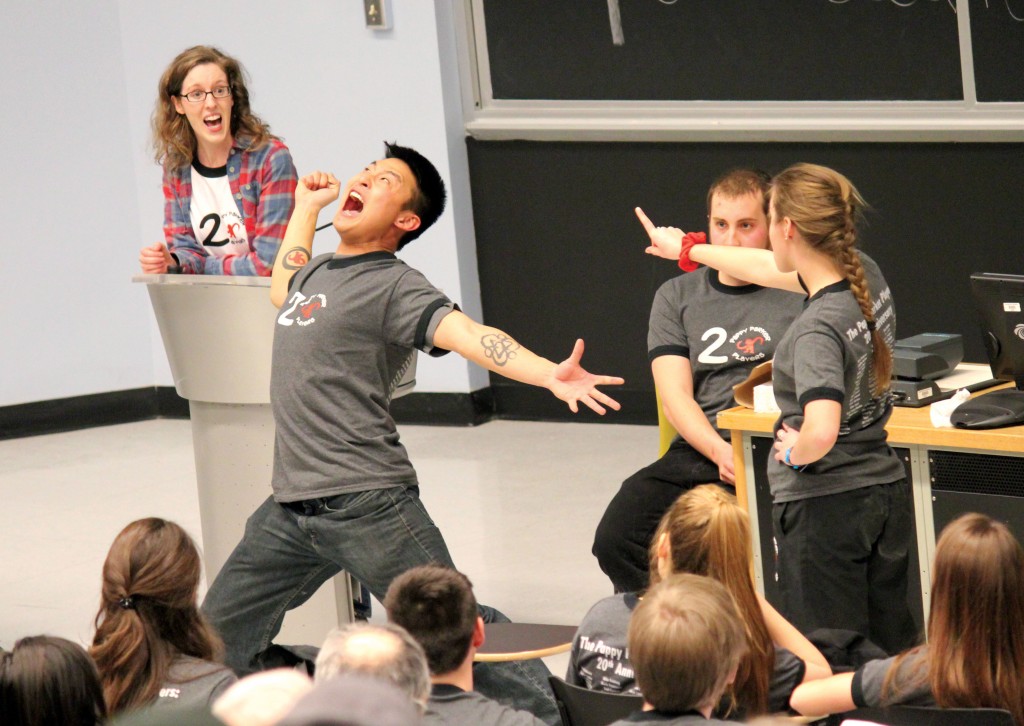The Pappy Parker Players, Binghamton University’s only improv sketch comedy group, celebrated their 20th anniversary on Saturday.
At a sold-out show held in Lecture Hall 1, former Pappys and this year’s cast performed more than two hours of sketches that incorporated the audience made up of students, faculty and parents alike.
Nearly every sketch drew inspiration from the crowd. The Pappys asked the audience, among other things, for specific words, topics, possible movie titles and non-geographical locations.
In one sketch known as “Text Reader,” the text messages of one unsuspecting student were incorporated into the show. In another sketch, an equally unsuspecting student was brought on stage following encouragement from the Pappys and the audience. A large group of the old and current Pappys used basic information the student shared about herself to take turns singing humorously about her goals, interests and fears.
In a sketch known as “Party Quirks,” one Pappy — “the host” — left the room while three other Pappys were given quirks as designated by the audience. Upon the host’s return, the three other Pappys acted their parts until the host could guess who or what they were.
One Pappy, given the role of “Kool-Aid man,” would enter the room noisily by kicking a chair while yelling “OH YEAH!” He did this a number of times before the host, a former Pappy, was finally able to guess his quirk.
“They exuded funny from every orifice,” said Janine Furtado, a sophomore majoring in environmental science.
Rob Miles, a sophomore majoring in philosophy, politics and law, said he was laughing throughout the entire show.
“It felt like my lungs were going to collapse, in a good way,” Miles said.
Although the group received a positive reception from students in the audience, Jon Karlas, the current president of the Pappys, said that the event on Saturday was geared for the group’s alumni.
“Usually we’re about putting on a show for our audience, but the major focus for the group is to help the alumni relive their days of the group, to learn from them, and to show what we’ve added,” said Karlas, a senior double-majoring in German and philosophy, politics and law. “It went much better than expected, and ended in a timely matter. I laughed my ass off, to put it plain and simple.”
Formerly known as the Dickinson Players, the group’s present name comes from a high-fat fried chicken meal called “Pappy Parker Chicken,” which was once sold in the dining halls on campus, according to Karlas.
According to their website, the Pappys have performed alongside a number of professional comedy troupes, including Derrick Comedy and the Upright Citizens Brigade.
Four of the nine members in the Pappys this year are females, the most the group has ever seen.
Taryn Lindquist, a Pappy member and a senior in the Decker School of Nursing, said making people laugh is what she enjoys most.
“You have to not try to be funny,” Lindquist said. “You just go out and you follow the rules of improv, and then as soon as you get your first laugh, I say it clicks. Until you get that first laugh, I don’t feel that comfortable. I’m a little nervous until I get that first laugh, and then my adrenaline starts rushing.”
Deanna Dunne, a Pappy member and a junior majoring in neuroscience, described how the group works together.
“It’s cool because we’re a group,” Dunne said. “So even if you weren’t the person that got the big laugh or whatever, you still contributed to it and you can still feel proud of yourself.”
Karlas and Lindquist said they have certain tricks to keep the audience engaged.
“When in doubt, pull out an F-bomb,” Karlas said.
“You try to keep the low-brow humor for really desperate times,” Lindquist said. “So if nobody’s laughing you pull out bodily functions, body parts, you know, sex, disease, stuff that is very controversial.”
Kristy Robinson, the group historian and a junior majoring in sociology, said the audience’s involvement is key to the Pappys’ success.
“I feel like the best part about our group is that the audience is involved in what we do,” Robinson said. “We ask them for suggestions, we work with them, it’s all about the audience. There’s no divide; they’re a part of what we do.”



